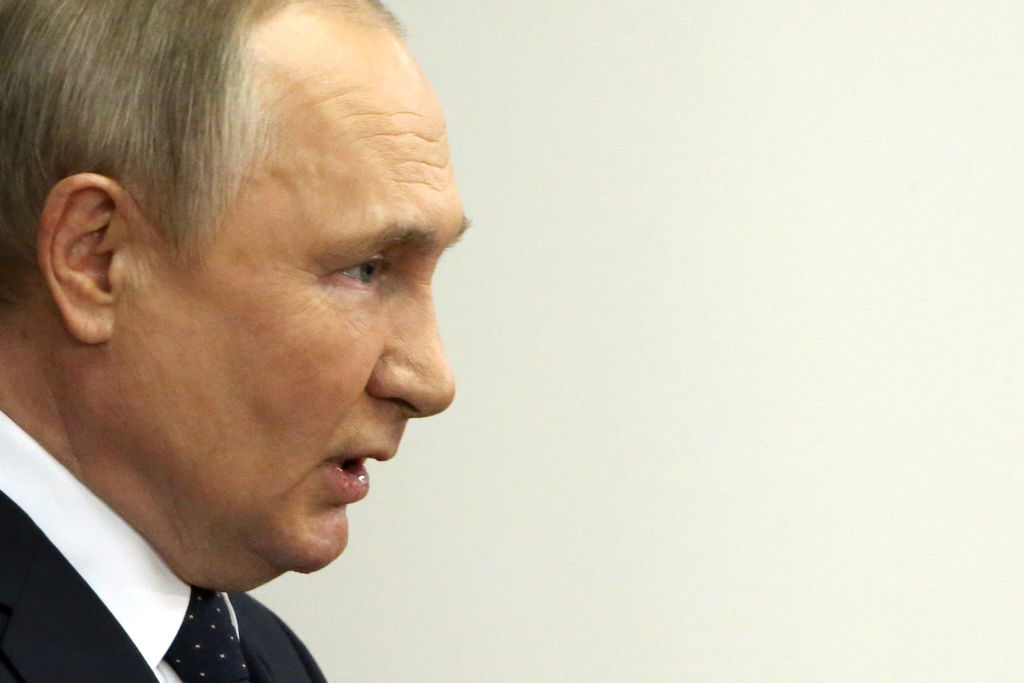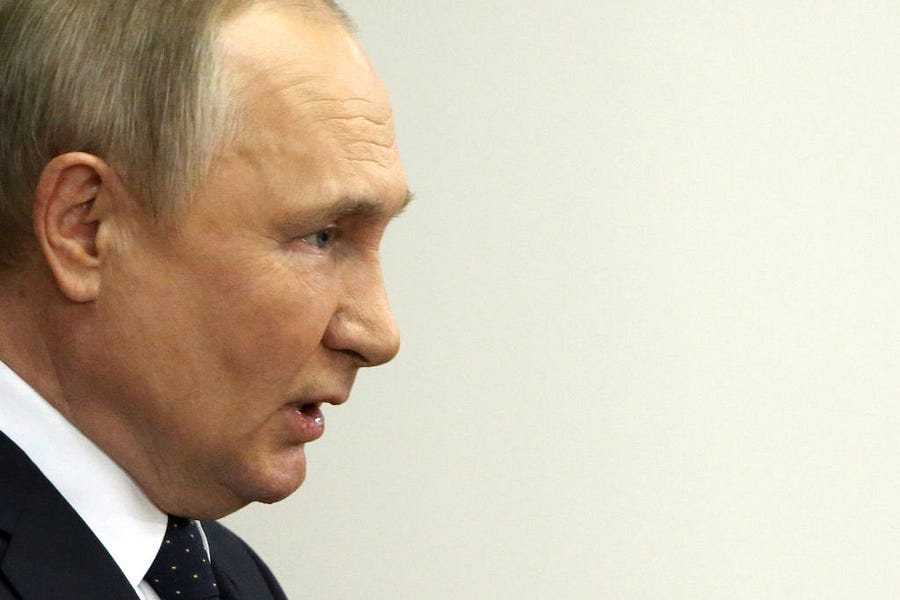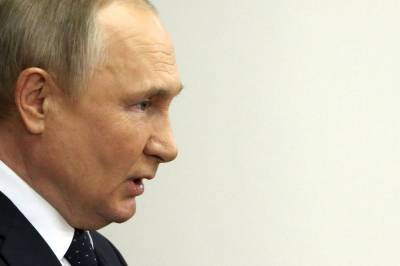Happy Monday! Shoutout to the turkey (or turkeys) terrorizing joggers and cyclists on a trail in northeast Washington, D.C. We all get excited about spring!
Quick Hits: Today’s Top Stories
The Federal Reserve’s preferred measure of inflation, the personal consumption expenditures price index, increased 6.6 percent year-over-year in March, the Bureau of Economic Analysis reported Friday. The measure was up from 6.3 percent in February, and at its highest level since 1982. Consumer spending also rose 1.1 percent in March from a month earlier—but just 0.2 percent once adjusted for inflation.
Dmitry Rogozin, head of Russia’s space program, told state media that Russia will cease its participation in International Space Station missions as retaliation for sanctions. “The decision has been taken already, we’re not obliged to talk about it publicly,” Rogozin said Saturday. “We’ll inform our partners about the end of our work on the ISS with a year’s notice.”
A National Security Council spokesman confirmed the Biden administration is looking to weaken Russia’s tech and manufacturing sectors by working with Congress to waive certain visa requirements for Russians with master’s or doctoral degrees in science, technology, engineering, or mathematics, allowing those who want to leave their home country to apply for U.S. visas without a sponsoring employer. The proposed visa waivers would last for four years, and potential immigrants would still undergo security vetting.
Germany’s Economy Ministry reported Sunday the country could end its dependence on Russian oil by the end of the summer, continuing the country’s sharp reversal of its previous reluctance to drop Russian energy. German officials have already agreed to a European Union embargo on Russian coal and plan to cut out Russian gas by mid-2024. Bloomberg reported the European Union plans to gradually phase out Russian oil by the end of the year—though a Hungarian official said Sunday that country would veto any energy restrictions.
Ukrainian President Volodymyr Zelensky said about 100 civilians escaped this weekend from the Mariupol steel plant where Ukrainian forces are holding out under ongoing Russian bombardment. Satellite images show at least three mass grave sites dug recently in villages near Mariupol, where as many as 100,000 people remain after a weeks-long siege.
With Beijing officials on Sunday reporting the highest number of new COVID-19 cases of its recent Omicron outbreak, the city’s government has temporarily banned restaurant dining and ordered residents to show a negative COVID-19 test to enter any public venue. Shanghai residents, meanwhile, are still under lockdown despite official case counts declining. Amid widespread lockdowns and quarantines, China’s manufacturing activity has fallen to its lowest level since February 2020.
The Federal Bureau of Investigation performed as many as 3.4 million searches of U.S. data collected by the National Security Agency last year without a warrant, according to a report released Friday by the Office of the Director of National Intelligence. The true number of searches is likely lower—it’s difficult to separate foreign data from domestic—but it represents a marked increase from the year before. Approximately 2 million of the searches—authorized by Section 702 of the Foreign Intelligence Surveillance Act—were connected to an investigation into an alleged Russian attempt to hack U.S. critical infrastructure, and the ODNI report didn’t allege any wrongdoing by the FBI.
How the Russia-Ukraine War Could Escalate

“I think the risks of escalation are really significant, and we should be more worried about it than we are.”
With those words, Kori Schake—director of foreign and defense policy studies at the American Enterprise Institute—had just silenced the room of journalists, cybersecurity experts, and national security officials gathered in Sausalito, California for the Hewlett Foundation’s annual Verify conference. Speaking on a panel with Pentagon official Mieke Eoyang and Susan Glasser of The New Yorker, Schake began to tick through the various ways the war in Ukraine could get worse.
“Russia appears to be losing this war, it has lost at a strategic level already,” she said. “If I were Vladimir Putin, it would be less humiliating to lose a war to the United States or NATO than it would be humiliating to lose a war to Ukraine. And that suggests, to me, incentives for escalation.”
As we’ve written in recent weeks, Russian forces—failing to capture Kyiv—pivoted earlier this month to a scaled-down war aim: Control of Ukraine’s Donbas region. “Russia is repositioning its forces to concentrate its offensive operations in eastern and parts of southern Ukraine, rather than target most of the territory,” National Security Adviser Jake Sullivan said at the time. “All indications are that Russia will seek to surround and overwhelm Ukrainian forces in eastern Ukraine.”
That process is underway, but a senior U.S. Defense Department official told reporters Friday Russian forces are “several days” behind schedule and “nowhere close” to linking their northern and southern battalions in their attempted encirclement of the Ukrainian military. “They don’t want to make the same mistakes that they made in Kyiv,” the official said, explaining why Russian progress has been so plodding and uneven. “They’re still a little wary of getting out ahead of their supply lines. … It is very doctrinal in its approach: Launch artillery strikes in advance of ground movements, and then—only then, when you think you’ve softened up the Ukrainian lines—do you start to move your ground units. But they’re running straight into stiff Ukrainian resistance.”
The United Kingdom’s Ministry of Defense reached a similar conclusion. “Due to strong Ukrainian resistance,” it said Friday, “Russian territorial gains have been limited and achieved at significant cost to Russian forces.”
But the aggressors are making some territorial gains, and the Donbas’ less urban terrain should play to Russia’s strengths. The question, then, is whether Ukraine can hold out long enough for Russian attrition—heavy losses were already sustained in the first phase of the war—to reach unsustainable levels. “Without national mobilization, I think the Donbas is the last major offensive the Russian military can attempt given the current state and availability of forces,” Michael Kofman—Russian military expert at CNA—said last week. “Whether it succeeds, or fails, the Russian military will be largely exhausted in terms of offensive potential.”
Rob Lee—a Foreign Policy Research Institute senior fellow and doctoral student studying Russian defense policy—put some numbers to that in a piece for The Economist over the weekend. “A NATO official put the figure as high as 40,000 [Russians] killed, wounded and captured a month ago,” he wrote. “Russia’s initial invasion force of approximately 125 battalion tactical groups (BTGs) added up to fewer than 100,000 troops in total. Importantly, not all of those were combat forces. That figure includes those responsible for air defense, electronic warfare and other support functions.”
“An attacking force typically seeks a three-to-one numerical advantage over the defender, if not more,” he continued. “That degree of superiority is now probably beyond Russia, except at the tactical level in some locations. It will probably try to compensate for this lack of manpower in maneuver units with air strikes and artillery. Russia may also rely more heavily on less well-trained militia forces from Donetsk and Luhansk. But this isn’t a recipe for a rapid breakthrough, and the Ukrainian military has demonstrated it is capable, creative and well led. More likely, any Russian advances will be slow and costly.”
The Ukrainian military has indeed proven itself more than capable these past few months, but it isn’t operating in a vacuum. European nations—from the UK, to Poland, to France, to Germany, to Estonia, to Latvia, to Lithuania—have combined to supply Ukraine with billions of dollars worth of weaponry, and the United States alone has provided about $3.4 billion in military assistance since Russia’s invasion began. The White House’s latest $800 million tranche included heavy equipment like howitzers and artillery rounds, tactical vehicles, and drones—and President Joe Biden on Thursday requested Congress authorize another $33 billion for the cause.
The United States’ involvement in the war isn’t limited to supplies, either. Pentagon spokesman John Kirby announced Friday U.S. troops stationed in Germany had begun training Ukrainian Armed Forces on artillery systems and armored vehicles provided in the package. A few days earlier, anonymous American officials leaked to NBC News that the United States has been providing Ukraine with “near real-time intelligence” that, among other things, has helped Ukraine’s military move air defenses and aircraft out of the way of Russian artillery and shoot down a Russian transport plane with hundreds of troops aboard. A National Security Council spokesman confirmed the existence of the ongoing intel operation, which Kofman said has “likely had a significant impact on the war.”
Following a visit to Kyiv last Sunday, Defense Secretary Lloyd Austin made clear the United States wants “to see Russia weakened,” and—though unsanctioned by the Pentagon—a former Marine from Kentucky was reportedly killed fighting alongside Ukrainians last week. “The United States has been very forward leaning in how we have been providing capacity to Ukraine,” Eoyang—deputy assistant secretary of defense for cyber policy—said at the Hewlett Foundation event. “We had had a bunch of teams on the ground in Ukraine to help identify malware, and help them with that.”
Add it all up, and the Kremlin’s recent accusations aimed at the United States—that NATO is essentially fighting a “proxy war” against Russia through Ukraine—don’t seem quite as far-fetched.
“The administration started off with a really clear setting of boundaries about the limits of American interests and involvement, and the overriding concern to avoid American involvement,” Schake said. “But since then, I think the administration has been increasingly trying to take credit for Ukraine’s success. … Publicly muddying the waters about where the limits of our interests and our involvement are, I think, is tempting Russia to consider us a direct combatant in the war.”
What would that mean? If Russia is having this much trouble subduing Ukraine’s military, surely it recognizes it wouldn’t stand a chance against the United States and NATO. “[That understanding] drives our adversaries to the margins of the conflict spectrum,” Schake said. “It drives them to terrorism. It drives them to nuclear escalation. It drives them to hybrid threats, like trying to corrode our societies. It drives them to cyber.” She noted Russia could begin more overtly targeting American weapons shipments, unleash more of its cyber capability than we’ve seen thus far, or even attempt to level Kyiv with a tactical nuclear weapon.
But Eoyang said the Pentagon’s assessment is that Putin does not want to escalate the situation further. “There’s been a lot of signaling on all signs about disinterest in widening this conflict,” she noted. “We’ve been very clear about not wanting to fight Russia directly. And I think that they are also signaling that their preference is that we not get involved in this.”
That said, she noted that it’s “a little unpredictable when things are in the control of a particular leader where they may wake up and change their mind.”
Worth Your Time
In The Atlantic, Peter Pomerantsev tells the story of the Horbonoses, a Ukrainian family that—against their will—shared their Lukashivka home with five invading Russian soldiers for about three weeks. “Over the course of those several weeks, a period the Horbonoses recounted to me аnd my colleague Andrii Bashtovyi, the cellar in Lukashivka became a microcosm of the war’s propaganda front,” Pomerantsev writes. “On one side were the Russians, who repeated a litany of falsehoods they had been told about their assault; on the other, the Ukrainians, wondering how their home could be decimated by aggressors driven by a fiction. Yet after meeting with the Horbonoses and, in the same week, with their nation’s leader, President Volodymyr Zelensky, I was struck by how clearly the family’s experience also informs a question haunting the many politicians, officials, journalists, and activists in Ukraine and abroad desperately trying to bring this war to a close: How do you persuade Russians who have been fed an unending series of lies to drop their support for Putin’s invasion of Ukraine?”
The New York Times published a three-part series from Nick Confessore over the weekend looking at the forces behind Tucker Carlson’s rise and the outsized effect his show has had on Fox News. “Mr. Carlson’s producers often trawl the web for supporting material, scouring widely read Trumpian sites like Breitbart and The Federalist, obscure right-wing blogs and other corners of the internet,” Confessore writes. “Early on, clips would sometimes be sent to the network’s research team, an Ailes creation known as the Brain Room, for further fact-checking. When Mr. Carlson’s team requested statistics or original research, it frequently revolved around immigration or race, for instance the respective percentages of Asian-descended and black people in college. According to one former employee who interacted with Mr. Carlson’s team, the Brain Room would occasionally discover that a story had actually originated farther afield, on a racist or neo-Nazi site like Stormfront. Sometimes the Brain Room suggested that ‘Tucker Carlson Tonight’ look for a different source, and over the years, the researchers there heard less and less from Mr. Carlson’s team. ‘They weren’t digging,’ the former Fox employee said. ‘They were looking for outrageous stories to outrage their audiences.’”
Presented Without Comment
Also Presented Without Comment
Also Also Presented Without Comment
Toeing the Company Line
On Friday’s episode of Advisory Opinions, David and Sarah discuss the football coach who prayed his way to the Supreme Court, Miranda rights, and which Supreme Court justices are absolute hotties.
Brutal economic numbers are turning Democrats’ midterms headache into a migraine. On Friday’s episode of The Dispatch Podcast, Steve, Jonah, and David discuss who should get the blame for that, and whether forgiving student loans is such a great idea. Plus: The return of Ronald Reagan?
Kevin McCarthy is doing damage control, and in this week’s Uphill (🔒), Harvest and Audrey take a look at what he’s up to, and whether it’s working. They also cover Homeland Security Secretary Alejandro Mayorkas’ trip to the Hill to answer lawmakers’ questions, including this one from Ohio GOP Rep. Jim Jordan: “Secretary, have you done anything right?”
In Friday’s G-File, Jonah looks into the funhouse mirror of Twitter and spies a can of mixed (political) nuts. “The most significant thing about Musk’s (very likely) acquisition of Twitter is not the acquisition of Twitter itself but how big a deal people are making of it,” he writes. “Abe Greenwald over at Commentary said it best a couple weeks ago, ‘People believe Twitter is the real world. They therefore believe that Elon Musk is buying the world.’”
“The Northman” has some weird stuff going on, Ethan McGuire writes in his review of the movie on the website this weekend. That’s partly because it takes the unusual step of looking at the history, spirituality, and men it portrays without judgment—and also because it’s based on premodern Icelandic poetry.
Compassion sounds nice until it gets applied to our enemies, David points out in this Sunday’s French Press. “The culture often claims it wants Christians to be like Christ, but does it really?” he asks. “The spirit of the age is better described by a famous quote by a Peruvian general and president named Óscar Benavides: ‘For my friends, everything; for my enemies, the law. Christ responds with, ‘For my friends, mercy; for my enemies, mercy.’”
Let Us Know
Are you concerned about Russia seeing the United States as a “direct combatant” in the war, or is it a distinction without a difference at this point?







Please note that we at The Dispatch hold ourselves, our work, and our commenters to a higher standard than other places on the internet. We welcome comments that foster genuine debate or discussion—including comments critical of us or our work—but responses that include ad hominem attacks on fellow Dispatch members or are intended to stoke fear and anger may be moderated.
With your membership, you only have the ability to comment on The Morning Dispatch articles. Consider upgrading to join the conversation everywhere.